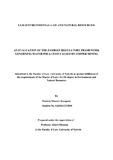| dc.description.abstract | The main focus of this paper is to evaluate the Zambian regulatory framework governing
water pollution caused by copper mining. This evaluation is based on the legal and
institutional framework in Zambia. The paper concentrates largely on interrogating the extent
to which the principles of public participation and access to environmental information,
access to justice, and the use of Economic Instruments (EI) or Market Based Instruments
(MBIs) have been incorporated in the Zambian laws on environmental management and
conservation and ultimately in water pollution control.
The question investigated by this paper is whether the legal and institutional framework does
in fact address or mitigate water pollution arising from mining, in particular, copper mining,
keeping in mind the role that copper plays in Zambia' economy and the unusual characteristic
of water as a natural resource.
There is no doubt that the copper mining industry in Zambia poses a difficult paradox. On the
one hand it is the backbone of the economy while on the other it is one of the largest
contributors to water pollution. The situation is further complicated by the fact that there is no
way mining can be undertaken without polluting waste being produced. This being the case it
is imperative that the Zambian Government find both an economical and environmental
balance, which balance will take into consideration inter-generational and intra-generational
equity.
To this effect, this paper suggests that this balance can be achieved by ensuring that there are
not only adequate but effective laws enacted by the government of Zambia to address this
situation.
The main findings of this paper are:-
• Whilst Zambia does have robust and forward looking environmental legislation in
place, it is imperative that this is reflected in its constitution. The Constitutional
protection of environmental rights can be a powerful and potentially trans formative
step towards that elusive goal of ecological sustainability;
• Market Based Instruments (MBIs) and environmental regulation could be used side
by side, with the benefits of both being made available to a country. Moreover,
whereas regulation offers no incentive for firms to reduce pollution below the ambient
standard, MBIs like eco-taxes provide a constant incentive for polluters to reduce
pollution further in order to reduce their tax bill; and
• An aspect of capacity, enforcement and compliance of pollution control legislation is
the role of effective and adequate public participation of various stakeholders found in
communities affected by mining activities. However, when it comes to access to
environmental justice, there has been little or no interest in public interest litigation.
There has been only been one reported case undertaken involving water pollution.
Based on these findings, among others, this paper has concluded that in order to show the
importance of environmental issues, the right to a clean and safe environment should be
enshrined in the Constitution of Zambia. The Zambian' regulatory framework is indeed
robust but that there is also an urgent need to involve all stakeholders in ensuring that water
pollution is checked. The regulatory framework can be complemented or supplemented with
market based instruments, corporate social responsibility guidelines and an emphasis on
incentives for pollution prevention as opposed to punishment, penalties and licenses to
pollute. | en_US |

